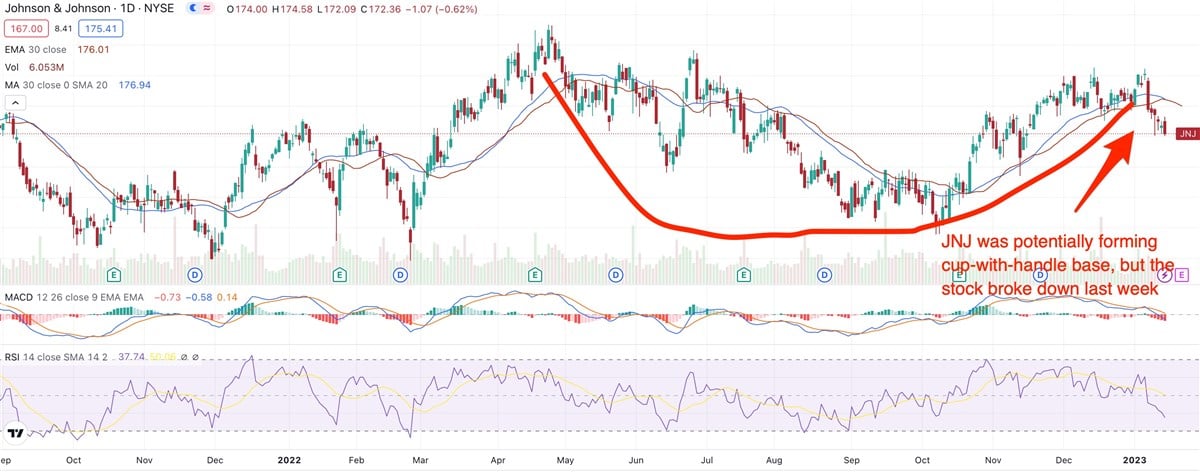As a member of the 30-stock Dow Jones Industrial Index and a heavily-weighted component of the S&P 500, Johnson & Johnson NYSE: JNJ is a stock that naturally gets a lot of attention from investors.
The stock has been struggling to break out of a correction that began in April last year. It formed a cup-shaped pattern that appeared to add a handle and came within 12 cents of passing an interim high price of $181.04 before breaking down on January 9.
Shares sliced through their 50-day average on January 9, and ended Tuesday’s session 0.6% below their 200-day line.

While that’s not good news in the near term, it’s unlikely that investors would stampede for the exits in an institutional quality stock like Johnson & Johnson, which has a market capitalization of $450.63 billion. It’s the ninth largest component of the S&P 500 and the second largest, behind UnitedHealth Group Incorporated NYSE: UNH in the S&P healthcare sector.
Johnson & Johnson shares are down 3.78% in the past week. The company confirmed some news that had been previously signaled: It’s reducing the production of its Covid-19 vaccines, which failed to gain the popularity of those created by rivals Pfizer Inc. NYSE: PFE and Moderna Inc. NASDAQ: MRNA.
Earlier in the month, pharmaceutical contract manufacturer Emergent BioSolutions Inc. NYSE: EBS said it would be restructuring and laying off employees to improve business performance. Emergent had been a manufacturer of J&J’s Covid vaccines but had a highly publicized mistake in 2020 when ingredients from J&J’s vaccine were mixed with those of AstraZeneca PLC NASDAQ: AZN.
The AstraZeneca vaccine was immediately manufactured elsewhere, and the U.S. government eventually terminated its contract with Emergent.
Emergent Says It’s Owed $420 Million
Emergent now says J&J owes it as much as $420 million for breach of contract.
There was another fairly significant piece of company-specific news for Johnson & Johnson last week. Fate Therapeutics Inc NASDAQ: FATE terminated an agreement with J&J business unit Janssen Biotech originally touted as having the potential for $3 billion in revenue. The agreement, forged in 2020, was established to jointly develop cancer therapies.
In the announcement terminating the agreement, Fate CEO Scott Wolchko said, “We are disappointed that we were not able to align with Janssen on their proposal for continuation of our collaboration."
San Diego-based Fate Therapeutics develops immunotherapies for the treatment of cancers. Its shares dropped more than 61% on the news.
J&J shares broke down 2.5% on January 9, the day CEO Joaquin Duato spoke at the J.P. Morgan Healthcare Conference, saying the company is seeking merger and acquisition opportunities in the areas of orthopedic and cardiovascular, surgical robotics, and eye care.
The company last month completed its acquisition of cardiac device maker Abiomed for $16.6 billion.
Consumer Products Unit Spinoff
Johnson & Johnson is spinning off its consumer healthcare unit (think Band-Aid, Neutrogena, Listerine, and Tylenol, among other products). The new business will be dubbed Kenvue and trade on the Nasdaq under the ticker KVUE.
Kenvue has filed regulatory paperwork for an IPO, but there’s no date yet for the pricing.
J&J said it expects the spinoff to be completed by November this year. Current J&J shareholders will still own their shares but receive Kenvue shares.
At the time of the spinoff announcement, J&J said, “It is expected that the overall shareholder dividend will remain at least at the same level following the completion of the transaction.”
Dividends are a key reason investors are drawn to well-established large caps like J&J. The company has a long history of dividend payments and increases, making it an attractive holding even during market downturns when a dividend payment can offset some price declines.
J&J’s current yield is 2.62%, as MarketBeat data show.
The company is due to report fourth-quarter results on January 24 before the opening, with Wall Street expecting a net income of $2.22 a share on revenue of $23.91 billion.
That would be a decrease in the top line and an increase on the bottom line.
Before you consider Johnson & Johnson, you'll want to hear this.
MarketBeat keeps track of Wall Street's top-rated and best performing research analysts and the stocks they recommend to their clients on a daily basis. MarketBeat has identified the five stocks that top analysts are quietly whispering to their clients to buy now before the broader market catches on... and Johnson & Johnson wasn't on the list.
While Johnson & Johnson currently has a Moderate Buy rating among analysts, top-rated analysts believe these five stocks are better buys.
View The Five Stocks Here
Discover the top 7 AI stocks to invest in right now. This exclusive report highlights the companies leading the AI revolution and shaping the future of technology in 2025.
Get This Free Report
Like this article? Share it with a colleague.
Link copied to clipboard.